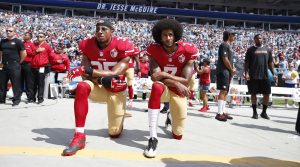Homosexuality is a controversial social issue. It is also a controversial religious issue. WORLD looked into a decision by the Southern Baptist Convention (SBC) to disassociate from a church whose pastor recently adopted a pro-gay position. [Read the full story]
According to the article, John Stonestreet of the Chuck Colson Center for Christian Worldview speculated that this issue could divide evangelicals. In that he may be correct. Regardless of any potential chasm—or worse, schism—created by their actions, the SBC made the right decision.
Christians to Disassociate from Some Professing Believers
Referencing a no longer extant letter, Paul tells the Christians in Corinth,
I wrote you in my letter not to associate with immoral people; I did not at all mean with the immoral people of this world, or with the covetous and swindlers, or with idolaters, for then you would have to go out of the world. But actually, I wrote to you not to associate with any so-called brother if he is an immoral person, or covetous, or an idolater, or a reviler, or a drunkard, or a swindler—not even to eat with such a one. For what have I to do with judging outsiders? Do you not judge those who are within the church? But those who are outside, God judges. REMOVE THE WICKED MAN FROM AMONG YOURSELVES. — 1 Cor 5:9-13
There are two issues involved: disassociation and judging. First, let’s look at the aspect of judging. Paul does not use “judge” in the negatively as in “to be judgmental.” Rather, the word means “to decide,” “to make a determination” regarding behavior. It means, simply, to recognize wrong actions; a synonym for this term is “discernment.” People do this every day.
The second issue is that of disassociating from someone. Paul indicates that when someone claims to follow Christ, yet brazenly and deliberately sins, Christians are to disassociate from that person. The purpose is not to inflate the egos of believers (pride is a sin) or to declare that the sinner is not saved (only God determines that). Rather, it is a means to motivate the person to recognize their sin, repent, and then be welcomed back to the family.
We see, then, that Paul is indicating that when believers recognize that someone willfully and unapologetically engages in sinful behavior, they are to disassociate form that person. This would apply to individuals and local churches. This is the basis on which the SBC chose to disassociate from a church with a now pro-gay pastor. Their decision is biblical and, thus, their decision is right because homosexuality is a sin.
Homosexuality is a Sin according to the Old and New Testament
In an earlier post I commented on the argument over whether the New Testament condemns homosexuality. Although it was not a comprehensive article, in it I outlined that both Testaments do, in fact, call homosexuality a sin.
In Romans, Paul refers to homosexual behavior as “degrading passions,” “unnatural,” “indecent,” and an “error” (cf. Rom 1:24-27). However, that is not the only New Testament passage referring to homosexuality as a sin. In his first letter to Timothy, Paul wrote,
But we know that the Law is good, if one uses it lawfully, realizing the fact that law is not made for a righteous person, but for those who are lawless and rebellious, for the ungodly and sinners, for the unholy and profane, for those who kill their fathers or mothers, for murderers and immoral men and homosexuals and kidnappers and liars and perjurers, and whatever else is contrary to sound teaching, according to the glorious gospel of the blessed God, with which I have been entrusted. – 1 Tim 1:8-11
Paul outlines a laundry list of sins, calling those who practice them “lawless and rebellious,” “ungodly and sinners,” and “unholy and profane.” The sins include murder, immorality (i.e., sexual immorality such as premarital or extramarital sex), homosexuality, kidnapping, lying, and perjury (i.e., lying in court under oath). He then included others under the term “whatever else is contrary to sound teaching,” which he defined as “according to the glorious gospel of the blessed God.” As you can see, homosexuality is deemed a sin, along with other sins. What is a sin? It is that which is “contrary to sound teaching,” i.e., the teaching found in the Law (the context of this passage, cf. v. 8).
It is clear, then, that there are only two possible conclusions: either that Paul’s writings are not scripture and should thus be rejected, or that homosexuality is a sin according to the Old Testament and the New Testament. The first option contradicts Peter’s words (cf. 2 Pet 3:15-16), opens the door to arguments that all of the Bible should be rejected as God’s word (if one part is suspect, all are suspect), and thus should be rejected. The second option, that homosexuality is a sin according to both Testaments, means that those who endorse homosexuality as biblical or somehow acceptable in God’s eyes, according to Scripture, are lawless, rebellious, ungodly, unholy, profane sinners (cf. 1 Tim 1:9).
The SBC Acted Rightly
The SBC was correct and biblical to disassociate from the church whose pastor endorsed homosexuality. Though some might disagree with that, their argument ultimately is not with me or my views, but with God and God’s Word.
It is my prayer that the pastor would repent. If he does not, I pray the church denies fellowship with the pastor until he does. It is my prayer that the members and the pastor of that church have a right relationship with God through Jesus Christ, uplifting and promoting righteousness and the gospel. Until that happens, though, the SBC should maintain its disassociation.














